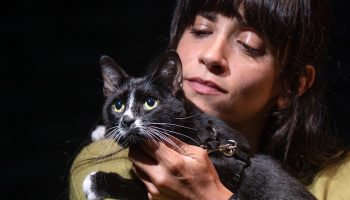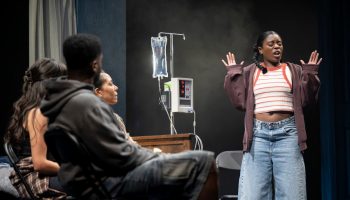
Gabriel Weber
Staff writer
At 3 p.m. Sunday in the Amphitheater, students in the School of Music Piano Program will showcase their talents with an incredibly expansive, yet well-timed afternoon program.
In 70 minutes, students will play “Overture to Candide” by Leonard Bernstein; “Danse Macabre” by Camille Saint-Saëns; “Barcarolle” from Suite No. 1 by Sergei Rachmaninoff; “Tarantella” from Rachmaninoff’s Suite No. 2; “En Bateau” and “Ballet” from “Petite Suite” by Claude Debussy; “Turkish March” by Wolfgang Amadeus Mozart; “Finale” from “The Carnival of the Animals” by Saint-Saëns; “Sabre Dance” by Aram Khachaturian; Preludes Op. 16 No. 1, 2 and 5 by Alexander Scriabin; “Overture to The Marriage of Figaro” by Mozart; Hungarian Dance No. 5 in F Sharp Minor by Johannes Brahms; Etude No. 11 by Kenji Bunch; two arrangements by George Gershwin; and “Galop-Marche” by Albert Lavignac.
As noted, it’s expansive.
Vivian Li, a second-year student of the School of Music, is playing “Overture to The Marriage of Figaro” by Mozart for four hands — meaning on one piano — with partner Tianxiang Ni and “En Bateau” and “Ballet” from “Petite Suite” by Debussy with partner Wanyue Zhao.
“En Bateau” has a very pretty and easily understood melody, Li said, while “Ballet” is contrasting in style with an exciting dance-like melody. Playing four hands with this piece is difficult, as Li has the second part and sits on the left, meaning she’ll control the pedal for her partner’s melody as she balances her own part.
There are benefits when playing four hands, as opposed to playing two pianos, Li said.
“Compared to two pianos, it’s easier to play together because you can see your partner, whereas with two pianos you’re across from each other, and you can only rely on breathing,” Li said.
There are several technical challenges in going from rehearsing in Sherwood-Marsh Piano Studios, where everyone is clustered together around the piano, to performing for a huge audience in the Amp.
“The piano is too big for the room (in Sherwood). It’s really easy to sound dry and really harsh in your tone,” Li said. “It’s hard to play intimately and quietly; but the good thing is, everything already has projection. In the Amphitheater, you need to worry about your projection. The sound escapes quickly.”
To ensure the volume is where it needs to be, Li said, the pianists will need to play deeper into the keys. The increased audience size is not extremely nerve-wracking for Li, however, as when she began playing at 5 years old, her parents had her perform “little concerts” to increase her confidence – which worked.
Currently pursuing her Bachelor of Music degree at the Eastman School of Music, she works with Associate Professor Alexander Kobrin, who also teaches at the School of Music at Chautauqua. His teaching style is centered around helping the students with their own ideas, Li said, and ensuring there is space for personality to shine through.

While Li describes her pianist style as passionate and full of energy; as a kid, she said, the lyrical style didn’t come naturally. Contrastingly, Soli Nallaseth details his style as gentler and lyrical — though it is constantly evolving, he said.
In his first year with the School of Music, Nallaseth will be playing “The Carnival of the Animals” by Saint-Saëns for four hands with partner Leni Zheng. Nallaseth is quite attached to this piece, as one of his earliest exposures to classical music was hearing Yo-Yo Ma play “The Swan” movement in “The Carnival of the Animals.”
“I feel enjoyment and vivacity. I feel really happy, like I’m a kid again. It puts me in touch with my childhood,” Nallaseth said. “The piece is not as technically demanding as a lot of other music that I play, so it allows me to engage with my imagination much more. I feel full of life when I play it and very engaged with the audience because it’s always an instant crowd hit.”
Nallaseth began playing piano at 5 years old as a hobby that he particularly enjoyed, he said. When he participated in a national competition in India and unexpectedly ended up winning — succeeding again two years later at a higher level in the same competition — he started to truly pour his efforts into growing as a pianist, as he enjoyed it more than anything else in life.
Recently graduated from the Royal Academy of Music with his Bachelor of Music and Master of Arts degrees, Nallaseth is currently pursuing his Doctor of Musical Arts in piano performance at the University of Southern California Thornton School of Music.
The Chautauqua Piano Program is highly selective, choosing only 20 students to engage in solo and chamber music performance opportunities, private lessons, faculty-led discussions and master classes. Nallaseth has appreciated the five weeks of independence and peace to sit with his craft.
“We’re always learning; we have at least one event a day, sometimes two, but there’s just a lot of space for me to just sit in a practice room and really think about what I want to do,” Nallaseth said. “It feels like a safe space for learning and showcasing your ability at exactly the same time. It’s a very difficult balance to strike, and Chautauqua strikes it brilliantly. That’s kind of the magic of being here.”




